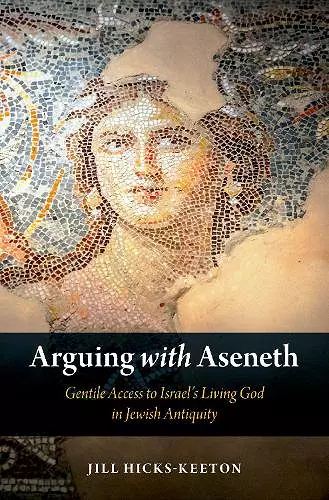Arguing with Aseneth
Gentile Access to Israel's Living God in Jewish Antiquity
Format:Hardback
Publisher:Oxford University Press Inc
Published:3rd Jan '19
Currently unavailable, and unfortunately no date known when it will be back

Arguing with Aseneth shows how the ancient Jewish romance known as Joseph and Aseneth moves a minor character in Genesis from obscurity to renown, weaving a new story whose main purpose was to intervene in ancient Jewish debates surrounding gentile access to Israel's God. Written in Greco-Roman Egypt around the turn of the era, Joseph and Aseneth combines the genre of the ancient Greek novel with scriptural characters from the story of Joseph as it retells Israel's mythic past to negotiate communal boundaries in its own present. With attention to the ways in which Aseneth's tale "remixes" Genesis, wrestles with Deuteronomic theology, and adopts prophetic visions of the future, Arguing with Aseneth demonstrates that this ancient novel inscribes into Israel's sacred narrative a precedent for gentile inclusion in the people belonging to Israel's God. Aseneth is transformed from material mother of the sons of Joseph to a mediator of God's mercy and life to future penitents, Jew and gentile alike. Yet not all Jewish thinkers in antiquity drew boundary lines the same way or in the same place. Arguing with Aseneth traces, then, not only the way in which Joseph and Aseneth affirms the possibility of gentile incorporation but also ways in which other ancient Jewish thinkers, including the apostle Paul, would have argued back, contesting Joseph and Aseneth's very conclusions or offering alternative, competing strategies of inclusion. With its use of a female protagonist, Joseph and Aseneth offers a distinctive model of gentile incorporation--one that eschews lines of patrilineal descent and undermines ethnicity and genealogy as necessary markers of belonging. Such a reading of this narrative shows us that we need to rethink our accounts of how ancient Jewish thinkers, including our earliest example from the Jesus Movement, negotiated who was in and who was out when it came to the people of Israel's God.
A lively study, I recommend the incorporation of Arguing with Aseneth into all libraries supporting the study of early Judaism and/or Christianity without reservation. * Michael Kochenash, Hunan University, Religious Studies Review *
Arguing with Aseneth is to be commended for its engaging prose, provocative and carefully-argued thesis, and treatment of various Second Temple traditions that productively inform Joseph and Aseneth. It is essential reading not only for those working on Joseph and Aseneth, but for all who engage in the context and literature of Second Temple Judaism. * Nicholas A. Elder, University of Dubuque Theological Seminary, Journal for the Study of Judaism *
...This book is an important contribution to the question of Jewish attitudes to Gentiles in Hellenistic Judaism, raising questions that go far beyond the particular case of Joseph and Aseneth. * John J. Collins, Yale University, The Journal of Religion *
Joseph and Aseneth presents an intriguing query into the function and intention of universal language. ...Hicks-Keeton participates in broader trends in the study of early Judaism which recognizes that later works incorporating scriptural stories did not merely comment on scriptural stories but crafted new tales of their own -- tales informed by the author's own historical contexts, concerns, and aspirations. The author of Joseph and Aseneth used the biblical story as a gateway to voice their own conceptions of Jewishness amidst a landscape of cultural contestation. Hicks-Keeton in Arguing with Aseneth listens to that creative voice and imagines the stakes of Aseneth's story for God-worshipping gentiles. * Krista N. Dalton, Reading Religion *
- Winner of Winner of the 2020 Manfred Lautenschlaeger Award for Theological Promise.
ISBN: 9780190878993
Dimensions: 236mm x 160mm x 33mm
Weight: 544g
232 pages